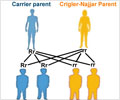Genetic mutations that may put individuals at increased risk of fungal infections has been identified by scientists from University College London and Radboud University.
According to researchers, the discoveries mark a significant step in the understanding of genetic susceptibility to fungal diseases.The findings have implications for people suffering from chronic mucocutaneous candidiasis (CMC), as well as more common infections like vaginal candidosis (thrush), they said.
The UCL-led study focused on patients from multiple generations of a large family who had suffered from serious recurrent fungal infections that proved lethal in some of those affected.
DNA sequencing and genetic mapping techniques enabled the researchers to identify that this family had a recurrent mutation in a gene called CARD9.
The team from Radboud University in the Netherlands found that a mutation in the gene Dectin-1 is associated with increased susceptibility to vaginal infections by fungi (primarily of the genus Candida).
When these two genes are working correctly, Dectin-1 senses the presence of fungi and prompts the immune cells to send signals that result in CARD9 setting off a molecular response in the immune system to protect against these microorganisms.
Advertisement
Both studies involved scientists from across the world. Critical experiments to prove the causality of the CARD9 mutation were done at the Technical University of Munich, Germany, where mice lacking the corresponding gene had been shown to be susceptible to fungal infections.
Advertisement
"Although the process of host response to fungal infection has previously been studied in mice, it is very interesting to see that it is the same in humans," said Professor Mihai Netea, who led the team from Radboud University.
"The new results show that the mechanisms to protect against fungal infections have been largely conserved by evolution between mice and humans, which is not necessarily the case for other microbes," Netea added.
The study has been published in the New England Journal of Medicine.
Source-ANI
RAS














